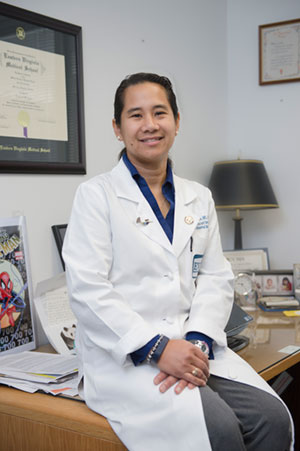 Section Head of Palliative Medicine at the Glennan Center
Section Head of Palliative Medicine at the Glennan Center
Medical Director of Palliative Medicine at Sentara Norfolk General Hospital
Medical Director of Harbor’s Edge
Sue Faulkner Scribner Professor of Geriatrics, EVMS
Dr. Marissa Galicia-Castillo is an anomaly: born in Hampton Roads, she attended college and medical school in Hampton Roads, completed her residency and internship in Hampton Roads, and did her fellowship in Hampton Roads. An early interest in science and medicine drew her to the Magnet School for Health Professionals, a collaboration formed in 1986 to initiate early preparation for high school students for careers in the health professions through innovative biomedical curriculum and mentoring. She attended Old Dominion University for three years, completing her fourth and final year at EVMS, graduating in 1994 with a degree in Biochemistry and Biology.
She received her MD degree from EVMS in 1997, completing her internship and residency in Internal Medicine, followed by a fellowship in geriatrics in 2002. Dr. Castillo is Board certified in Internal Medicine, Geriatrics and Hospice and Palliative Care.
Her specific interest in geriatrics grew out of two events: as a teenager, she saw her grandmother grow suddenly ill and deteriorate, very soon dying of kidney failure. “She was only in her 60s,” Dr. Castillo recalls, “and she seemed so healthy. The next thing I knew, she was in ICU and then she died. It never made sense to me.”
Then during the year of her internship, she met two geriatricians – Dr. Stefan Gravenstein and Dr. Janet McElhaney – and working with their patients ignited her interest even further. “Not only were their cases more complicated and interesting from a medical perspective, I also found that for the most part, the patients were so appreciative, even of the tiniest gesture,” Dr. Castillo remembers. “We’d do something so small, so simple, and it made a huge difference to them.” Even getting them out of bed made a difference, she discovered. “You still see it today with geriatric patients,” she notes. “When they won’t (or can’t) get out of bed, they can decondition so quickly. It has a tremendous impact on them.”
Caring for geriatric patients is about more than practicing internal medicine. It’s also about talking to patients about what they want, and learning what their goals are. “The biggest difference is that their care is a team event,” Dr. Castillo notes. “And not just doctors. We need to also work with nurses, dieticians, physical therapists, occupational therapists, social workers so we address all areas to really take care of these patients.”
When Dr. Castillo isn’t serving as a Palliative Medicine physician in the hospital, she tends to patients at Harbor’s Edge, a Continuing Care Retirement Community in Norfolk that features independent apartments, assisted living, skilled nursing, and long-term care. She focuses her practice in those who live in the Health Care side of Harbor’s Edge.
Dr. Castillo has found that more and more, patients coming to skilled nursing facilities are much more ill than they used to be even five years ago. “Sometimes, they’re so debilitated, they’re at the point where rehabilitative care isn’t needed or wanted,” she says. “We see patients who have congestive heart failure and renal failure, maybe emphysema, and maybe cancer as well. Their prognosis is very limited. These are the patients who need palliative care and sometimes hospice.”
Much of her care depends on understanding what these patients want, and tailoring their treatment accordingly. She describes a typical situation: “A patient has a deadly combination, congestive heart failure and kidney failure. If I treat his heart failure by getting rid of the fluid, his kidney failure worsens; it’s a vicious cycle. So I ask him what his goals are, and he says he just wants to be comfortable.
“That’s what’s so interesting about geriatrics and palliative care: it’s all about function, and what’s important to the patient. In that patient’s case, knowing that he won’t suffer because of his kidney situation, and understanding what he wants, I pursue comfort measures for him. I give him medication to reduce his shortness of breath.”
It always depends, Dr. Castillo says, on what the patient wants. “Often they’ll say ‘please don’t send me back to the hospital, no poking or prodding, just make me comfortable.’ Others might say they want some measures taken, like some labs and maybe a ventilator, if there’s a chance they can come back. And others may want a full-court press: everything that’s medically appropriate. That’s why talking – and listening – to patients is so important.
“Geriatrics is much like palliative medicine, in the sense that we try to improve quality of life and function for these patients, to the best degree possible. These two concepts go hand-in-hand, and they are enormously satisfying.” At EVMS, Dr. Castillo teaches primary palliative medicine to medical students, residents and Fellows, which includes teaching them to talk to patients and their families about the entire spectrum of caring for geriatric patients. She laments the shortage of both geriatricians and palliative care physicians, and hopes that training the next generation of physicians in both Geriatrics and Palliative Medicine concepts can help address the growing need.

